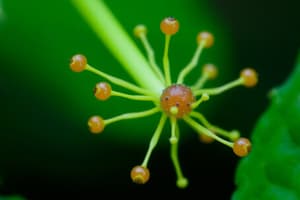Podcast
Questions and Answers
What is the first step in the scientific method after formulating a hypothesis?
What is the first step in the scientific method after formulating a hypothesis?
- Analysis
- Prediction
- Experiment (correct)
- Conclusion
Which level of biological organization is composed of different tissues working together?
Which level of biological organization is composed of different tissues working together?
- Cells
- Macromolecules
- Organs (correct)
- Organ Systems
Which of the following tools is primarily used in biology for genetic analysis?
Which of the following tools is primarily used in biology for genetic analysis?
- Bioinformatic tools (correct)
- Computer modeling
- Microscope
- Biotechnology tools
What is NOT a reason for studying biology?
What is NOT a reason for studying biology?
Which of the following best defines 'ecosystems'?
Which of the following best defines 'ecosystems'?
What is the main focus of botany?
What is the main focus of botany?
Which concept describes the stable internal environment of an organism?
Which concept describes the stable internal environment of an organism?
What process do plants use to convert light energy into food?
What process do plants use to convert light energy into food?
What does the study of ecology focus on?
What does the study of ecology focus on?
Which of the following is NOT a fundamental concept in biology?
Which of the following is NOT a fundamental concept in biology?
What does the term 'metabolism' refer to in biology?
What does the term 'metabolism' refer to in biology?
Which branch of biology focuses on the structure and function of cells?
Which branch of biology focuses on the structure and function of cells?
Which step of the scientific method involves creating a testable explanation?
Which step of the scientific method involves creating a testable explanation?
Flashcards
Prediction
Prediction
Forecasting the result that would be expected if the hypothesis were correct.
Experiment
Experiment
Conducting a controlled investigation to test the hypothesis.
Analysis
Analysis
Evaluating the results of the experiment.
Conclusion
Conclusion
Signup and view all the flashcards
Atoms
Atoms
Signup and view all the flashcards
What is Biology?
What is Biology?
Signup and view all the flashcards
What are cells?
What are cells?
Signup and view all the flashcards
What is photosynthesis?
What is photosynthesis?
Signup and view all the flashcards
What is cellular respiration?
What is cellular respiration?
Signup and view all the flashcards
What is Botany?
What is Botany?
Signup and view all the flashcards
What is Zoology?
What is Zoology?
Signup and view all the flashcards
What is Homeostasis?
What is Homeostasis?
Signup and view all the flashcards
What is Evolution?
What is Evolution?
Signup and view all the flashcards
Study Notes
Topic Subtitle
- Biology is the scientific study of life and living organisms, encompassing their structure, function, growth, evolution, distribution, identification, and taxonomy.
- Living organisms are composed of one or more cells.
- Living organisms require energy for life processes.
- Organisms exhibit homeostasis, maintaining a stable internal environment.
- Reproduction is essential for the continuation of life.
Branches of Biology
- Botany: The study of plants, including their structure, function, classification, and ecology.
- Zoology: The study of animals, including their structure, function, classification, behavior, and ecology.
- Microbiology: The study of microorganisms like bacteria, viruses, fungi, and protists.
- Genetics: The study of heredity and variation in living organisms.
- Ecology: The study of the relationships between organisms and their environment.
- Physiology: The study of the functions and processes of living organisms.
- Molecular Biology: The study of biological molecules and their interactions.
- Evolutionary Biology: The study of the processes leading to life's diversity on Earth.
- Cell Biology: The structure and function of cells.
Fundamental Concepts in Biology
- Cells: The basic units of life.
- Energy: Required for life processes.
- Homeostasis: Maintaining a stable internal environment.
- Reproduction: Producing offspring.
- Heredity: Passing traits between generations.
- Adaptation: Organisms' becoming better suited to their environment.
- Evolution: Gradual change in populations' characteristics.
- Diversity: The wide variety of life forms on Earth.
Key Biological Processes
- Photosynthesis: Plants and organisms use light energy to convert carbon dioxide and water to sugar and oxygen.
- Cellular Respiration: Cells break down sugar to release energy.
- Metabolism: All chemical reactions in an organism.
- Nutrient Cycling: Nutrients cycle between organisms and the environment.
- Regulation: Controls biological processes.
- Growth and Development: Increase in size and complexity of organisms.
Scientific Method in Biology
- Observation: Recognizing a natural phenomenon.
- Question: Asking about a phenomenon.
- Hypothesis: A testable explanation.
- Prediction: Forecasting results if the hypothesis is correct.
- Experiment: Controlled investigation testing the hypothesis.
- Analysis: Evaluating experimental results.
- Conclusion: Drawing conclusions based on analysis.
Levels of Biological Organization
- Atoms: Basic building blocks of matter.
- Molecules: Groups of atoms bonded together.
- Macromolecules: Large molecules like proteins, carbohydrates, and lipids.
- Organelles: Specialized structures within cells.
- Cells: Basic units of life.
- Tissues: Groups of similar cells working together.
- Organs: Structures of different tissues working together.
- Organ Systems: Groups of organs working together.
- Organisms: Individual living beings.
- Populations: Groups of the same species in an area.
- Communities: Groups of different populations interacting.
- Ecosystems: Communities interacting with their environment.
- Biosphere: Global ecosystem encompassing all life on Earth.
Importance of Biology
- Understanding the natural world.
- Developing new technologies.
- Solving current and future problems.
Tools and Technologies in Modern Biology
- Microscopes (light and electron).
- Genetic sequencing technologies.
- DNA analysis techniques.
- Computer modeling.
- Bioinformatics tools.
- Biotechnology tools.
- Biology is interdisciplinary, applying to medicine, agriculture, and environmental science.
Studying That Suits You
Use AI to generate personalized quizzes and flashcards to suit your learning preferences.



